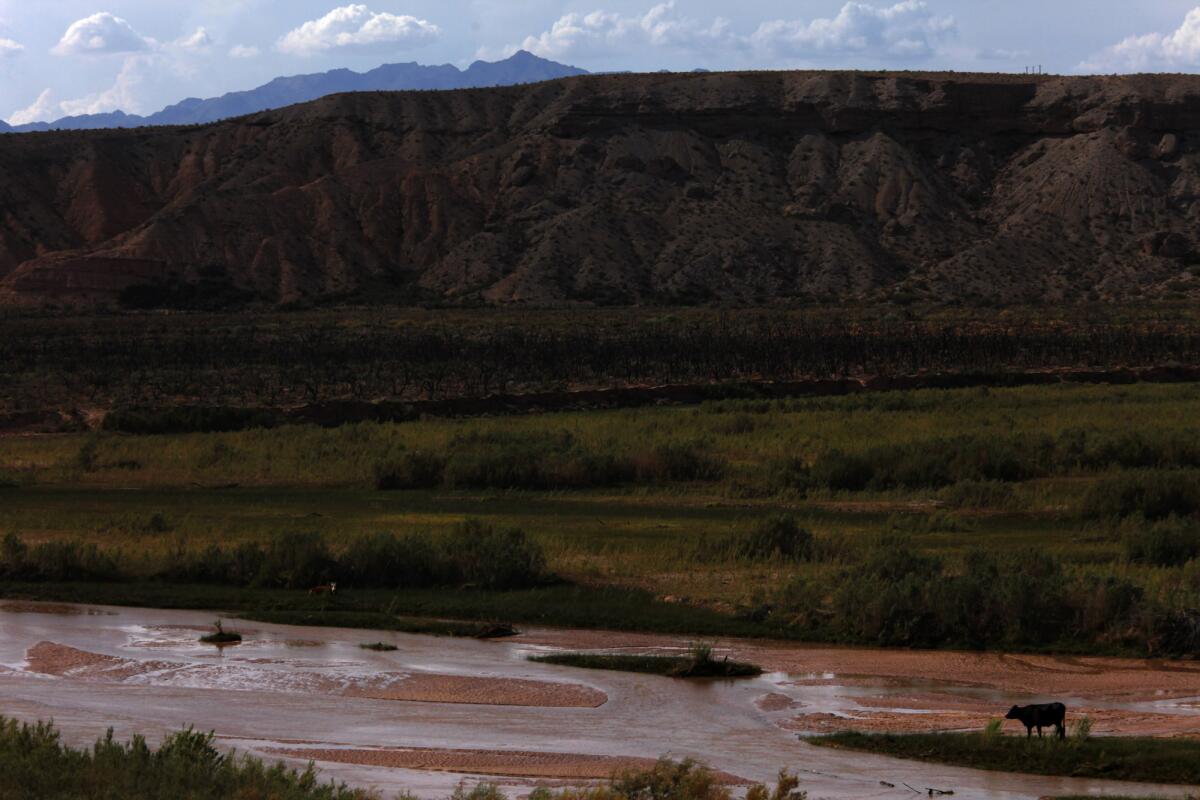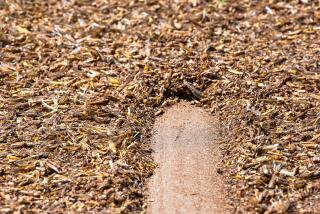Nevada ranchers defy drought closures, graze cattle on federal land

A lone cow stands on an island on the Virgin River in Nevada
- Share via
Reporting from Seattle — The big rains that have soaked parts of Nevada, Utah and Colorado in the last month have provided a brief and perhaps misleading sense of relief from the drought that is parching the West. The region’s long-term water supply depends on snowpack, which has been historically low in places.
Nevertheless, the late-spring rains have made the cheatgrass grow again in northern Nevada -- and that is one reason the Filippini ranching family decided to turn out cattle to graze there this week in defiance of drought closures ordered by the U.S. Bureau of Land Management.
“My understanding is their back was against the wall,” Ron Torell, the president of the Nevada Cattlemen’s Assn., said of the Filippinis, while emphasizing that he was not speaking for the family. “It affects their livelihood, and they felt they didn’t have another option.”
The Filippinis, in a Facebook post Monday, encouraged other ranchers to join them in grazing cattle on land declared off-limits.
“They have been eating hay since September 2014,” said the post. “The cattle are tapped out. The resource feed is not the issue with these beautiful timely rains. We are protecting our lives, liberty and property. Please come stand with us. God Bless!”
This time of year, many cattle ranchers typically graze their cattle on public land controlled by the BLM. When they make out their feed budgets, they count on their herds being able to forage, rather than eat in the stockyard. But in recent years, the bureau has ordered closures on certain grazing lands, citing the long-term damage scientists say grazing can cause when land is stressed by drought.
“Right now the vegetative drought is not very apparent because of the rain, but the underlying long-term hydrologic drought is still there,” said Rudy Evenson, a spokesman for the BLM in Nevada.
The bureau is not necessarily interested in protecting cheatgrass, which is an invasive species. But when cattle are allowed to range freely over a stressed area, Evenson said, they often eat the cheatgrass and then look for other food.
“They tend to overgraze the vegetation around water sources,” he said. “So the perennial grasses, native grasses that grow every year, the grasses that we want, run the risk of not being able to grow back.”
The Filippinis, who could not be immediately reached for comment, are currently appealing two bureau decisions that have prevented them from grazing in the Battle Mountain complex and in another area, called the Argenta allotment, both near the town of Battle Mountain, about 160 miles northeast of Reno. They have participated in horseback marches to protest the drought closures. Last week, they were in mediation talks with the bureau.
“It’s out of the ordinary for a grazing permittee to do something like this, especially with such unfortunate timing,” Evenson said.
But Evenson said the Filippinis should not be viewed as acting in the same vein as Cliven Bundy, the Nevada rancher who was joined by an armed militia last year when he refused orders to remove his cattle from federal land where he had long grazed them without a permit.
This week, Eddyann Filippini called the bureau’s acting state director, John Ruhs, to tell him she would be turning out cattle in the North Buffalo allotment of the Battle Mountain complex.
The area is a complicated mix of public and private land where cattle can easily move between the two. Filippini told the Elko Daily Free Press that she expected to turn out about 90 cattle, starting Tuesday.
“It’s peaceful, nonconfrontational,” Evenson said. “This is a group that has always worked with the Bureau of Land Management through the due process, following all the administrative rules. John Ruhs is in Battle Mountain today, talking with the Filippinis, and we’ll continue to work with them to resolve it. We’re not ordering them off the land. We’re working with them on a way that the resource can be used sustainably.”
Some environmentalists said the bureau had failed to protect public lands. Ken Cole of the Western Watersheds Project said ranchers think they can get away with defying the federal government -- because they can.
Cole accused the bureau of “enabling this kind of behavior by coddling Nevada ranchers who are surely emboldened by the lack of law enforcement within the agency and the lack of a commitment on behalf of our government to protect the public trust -- the lands, waters and wildlife that are already suffering from the drought and will now be further abused by these private cows.”
Twitter: @yardleyLAT
More to Read
Sign up for Essential California
The most important California stories and recommendations in your inbox every morning.
You may occasionally receive promotional content from the Los Angeles Times.











